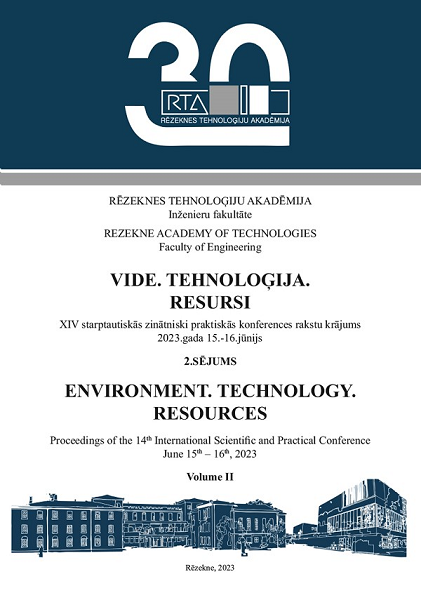DEVELOPING COMPUTER ENGINEERING AND INFORMATION TECHNOLOGY UNDERGRADUATES’ LEARNER AUTONOMY: INDIVIDUALISED INSTRUCTION IN ENGLISH CLASSROOM
DOI:
https://doi.org/10.17770/etr2023vol2.7274Keywords:
Computer Engineering and Information Technology undergraduates, English classroom, higher education institutions, learner autonomy, individualized learningAbstract
The rapid development of information science and technology encourages lifelong learning and requires university graduates to be able to learn throughout their lives and have special abilities which help them search for continuous education and training opportunities. For students who associate their professional lives with computer sciences, learner autonomy is of immense importance since it helps them take full responsibility for success in professional life and career and contributes to the sustainable development of the current fast-moving digital society. As autonomous learners Computer Engineering and Information Technology undergraduates are able to define their goals clearly, to identify the most optimal learning strategies for achieving these goals and for acquiring new knowledge and skills necessary for their further professional development. The present study is aimed at finding out Computer Engineering and Information Technology undergraduates’ viewpoints on effectiveness of individualised instruction for developing their learner autonomy in English classroom. With this in mind, the team of researchers applied a questionnaire to a sample of Computer Engineering and Information Technology undergraduates who study at three higher education institutions of Ukraine. Data collection lasted for three months and took place in September-December 2022. The obtained results clearly demonstrate that individualised instruction delivered through online teaching tools and apps in English classroom enables university teachers to develop Computer Engineering and Information Technology Undergraduates’ learner autonomy effectively.
References
K. Rajprasit & S. Hemchua, “The English language & Communication in the International Workplace: An Examination of Thai Computer Engineering Professionals”, 3L: Language, Linguistics and Literature, The Southeast Asian Journal of English Language Studies, 2015, 21 (3). pp. 109-124. [Online]. Available: http://journalarticle.ukm.my/9072/1/9222-27896-1-PB.pdf
O. Malykhin, N. Aristova and S. Melikova, “Soft Skills Development Strategies for Computer Engineering and Information Technologies Undergraduate Students Devised in the Process of Learning English”, in Proc. ETR International Scientific and Practical Conference, 2021, vol. 2, 255-260. https://doi.org/10.17770/etr2021vol2.6602.
S. Lee & J. Schmidgall, “The importance of English writing skills in the International Workplace”. 2020. [Online]. Available: https://files.eric.ed.gov/fulltext/ED614404.pdf. [Accessed: Jan. 12, 2023].
S. Xiao, “Self-Efficacy, Autonomy and the Relationships Towards to English Achievement”, in Proc. of the 2021 2nd International Conference on Mental Health and Humanities Education (ICMHHE 2021): Advances in Social Science, Education and Humanities Research, 2021, vol. 561, pp. 306-309. [Online]. Available: file:///Users/nataliya/Downloads/125958025.pdf. [Accessed: Nov. 10, 2022].
O. Malykhin, N. Aristova, N. Dichek and N. Dyka, “Formation of Top Job Skills of Tomorrow among Computer Engineering and Information Technologies Undergraduate Students in the Process of Learning English”, in Proc. ETR International Scientific and Practical Conference, 2021, vol. 2, 249-254, https://doi.org/10.17770/etr2021vol2.6642.
R. Smith, “Learner autonomy,” ELT Journal, October 2008, vol. 62, iss. 4, pp. 395–397, https://doi.org/10.1093/elt/ccn038
O. Malykhin and N. Aristova, “Improving Computer Engineering and Information Technologies Undergraduate Students’ Training through Combination of Formal, Non-Formal and Informal Learning”, in Proc. ETR International Scientific and Practical Conference, 2019, vol. 2, pp. 208-213, https://doi.org/10.17770/etr2019vol2.4113.
H. Holec, Autonomy and Foreign Language Learning. Oxford/New York: Pergamon Press. 1981. (First Published 1979, Council of Europe).
B. Ivanovska, “Learner autonomy in foreign language education and in cultural context”, Procedia – Social and Behavioral Sciences, 5 May 2015, vol. 180, pp. 352-356. https://doi.org/10.1016/j.sbspro.2015.02.128.
Á. Scharle & A. Szabó, Learner Autonomy: A Guide to Developing Learner Responsibility (Cambridge Handbook for Language Teachers) 1st Edition. Cambridge University Press 2000. [Online]. Available: [Accessed: Dec. 10, 2022].
K. Millsom, “Developing Learner Autonomy”, EFL Magazine, September 2016. [Online]. Available: https://eflmagazine.com/developing-learner-autonomy/. [Accessed: Dec. 17, 2022].
L. Xu, “A Study on College English Teachers' Role in Developing Learner Autonomy”, Theory and Practice in Language Studies, vol. 5, no. 2, pp. 435-441, February 2015. http://dx.doi.org/10.17507/tpls.0502.27
B. Horvathova, “Development of Learner Autonomy”, November 2016, pp. 120-136. [Online]. Available: https://www.researchgate.net/publication/345325424_Development_of_Learner_Autonomy. [Accessed: Jan. 27, 2023].
Individualized Instruction: Pace, Method, Content, Examples of Individualized Instruction, Final Issues. [Online]. Available: https://education.stateuniversity.com/pages/2085/Individualized-Instruction.html. [Accessed: Feb. 21, 2023].
J. Cox, “Individualized Instruction: Meeting the Needs of All Students Starts on the First Day of School”, WGU. [Online]. Available: https://www.wgu.edu/heyteach/article/individual-instruction-meeting-needs-all-students-starts-first-day-school2108.html. [Accessed: Feb. 12, 2023].
R. L. Collins, What is Individualized Instruction. [Online]. Available: https://www.ilearn.com/main/assets/pdf/What-is-Individualized-Instruction.pdf. [Accessed: Jan. 10, 2023].
K.-T. Lindnera & S. Schwab, “Differentiation and Individualisation in Inclusive Education: A Systematic Review and Narrative Synthesis”, International Journal of Inclusive Education, 16 September 2020. [Online]. Available: https://www.tandfonline.com/doi/full/10.1080/13603116.2020.1813450?scroll=top&needAccess=true&role=tab. [Accessed: Jan. 18, 2023]. https://doi.org/10.1080/13603116.2020.1813450.
A. Shemshack, J. M. Spector, “A systematic literature review of personalized learning terms”, Smart Learning Environments, 2020. 7: 33. https://doi.org/10.1186/s40561-020-00140-9.
Top Hat, Individualized Instruction. [Online]. Available: [Accessed: Jan. 11, 2023].



